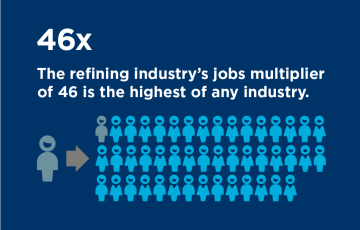The fuel and petrochemical industries employ highly trained, talented people who produce the fuels, feedstocks and products that are critical to the well-being of our economy and country. 
Supporting over 3.5 million jobs in all 50 states, these industries provide compensation that is roughly two to three times that of the average U.S. worker. These well-paying jobs, in turn, serve as the lifeblood of families, communities and states nationwide and will for decades to come. According to the U.S. Energy Information Administration, 76 percent of our energy demand in 2050 will be met by fossil fuels.
This long-standing reality has been recognized across the political spectrum:
“Oil and gas jobs are high-quality jobs, and as we rebuild the economy and transition, we need a plan to rebuild the middle class with family-sustainable wages, training and growth opportunities, and long-term and short-term benefits like the oil and gas construction sectors provide.
“Energy construction workers affirm that projects in oil and natural gas have better wages, benefits and opportunities than renewable projects. Additionally, workers say that the oil and natural gas industry offers projects with longer durations than those in the renewable industries, which means steadier income and more consistent benefits. [And] the research confirms what our members tell us: the career opportunities for renewables are nowhere near what they are in gas and oil, and domestic energy workers highly value the safety, reliable duration and compensation of oil and gas construction jobs.”
– Sean McGarvey, president of North America’s Building Trades Unions
"Our jobs are jobs that have a huge impact on the economy ... each refining job creates 18 other jobs in the community." – Justin Donley, President of USW Local 912
“Can we immediately start talking about jobs? … The truth is our refinery jobs are really good middle class jobs.” –California Assemblywoman Lorena Gonzalez (D-San Diego)
Oil and gas jobs “tend to be well-paying and come with good benefits—especially compared to clean energy. A worker on an oil rig can earn around $180,000; wind turbine technicians start under $55,000. … Among workers in fossil-burning power plants, union participation runs around 20% [which is] about the same in other fossil fuel production jobs. But in the wind and solar industries, it’s only between 4-6%. That’s about on par with the national average, but low enough to take a meaningful bite out of the kinds of benefits—not only salary, pension, and health-related, but also apprenticeship programs, dispute arbitration, and a clearly established career ladder—that many fossil workers are accustomed to.” – Quartz
“For more than a decade, a revitalized natural gas and oil industry … has generated the type of business investments we needed to reinvigorate our Main Streets. … It’s brought more family-sustaining local jobs and tax revenue to communities across the Commonwealth. Trade unions facing the prospect of their halls being emptied by demand for skilled labor have built modern training centers to supply a new generation of workers. Good-paying jobs aren’t a partisan issue. They’re something we all support.” – Washington County [PA] Commission Chairman Diana Irey Vaughan, Vice Chairman Larry Maggi and Commissioner Nick Sherman
“Those green energy jobs just don’t pay the way oil and gas industry pay … You have a higher pay and upward mobility in the oil and gas industry than in green jobs.” – Rock Zierman, CEO of the California Independent Petroleum Association
“Union members are fed this line that there are more jobs in the clean energy economy, and you can get a job as a solar installer. And they are going, ‘We know those are pretty crappy jobs.’” – Carol Zabin, director of Green Energy Program at UC Berkeley Labor Center
“At the San Jacinto College Center for Petrochemical, Energy & Technology, students earn associate's degrees in the energy and fuel industry. San Jacinto College offers five programs, including process, instrumental and electrical. Those are careers the college said earn the students good-paying jobs once they graduate. ‘Typically, starting salaries are around $70,000 a year,’ explained James Griffin, senior vice president of San Jacinto College's CPET. ‘Once you're fully-trained at a site, we see six figures, sure.’" – KTRK-TV Houston


